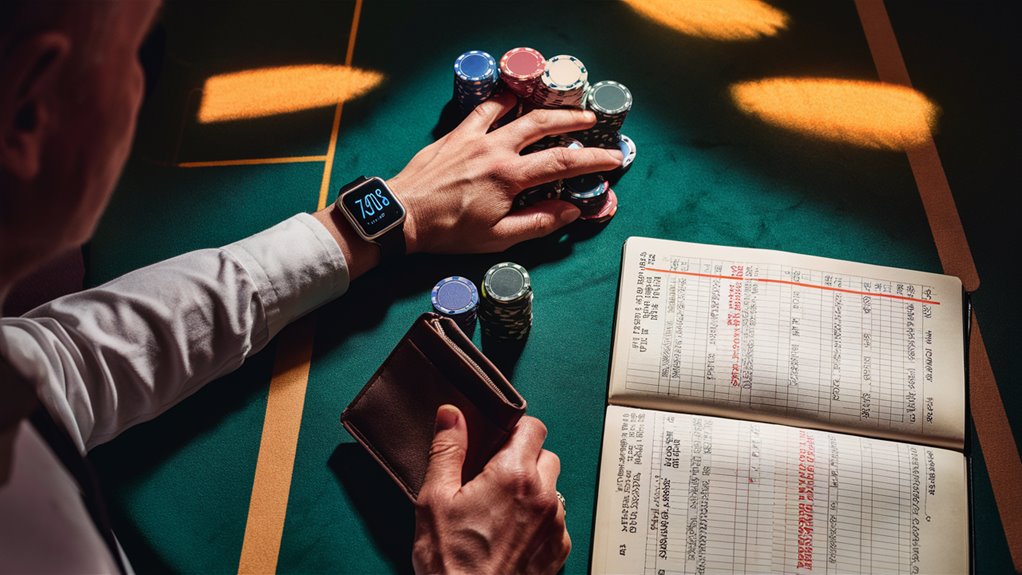Safe Gambling Tips: Key Rules for Safe Play

Setting Money Limits
Making strict money rules is the base of safe gambling. Make a set gambling fund apart from your must-pay costs. Never use money meant for rent, bills, or needs. Start a new gambling account to keep a clear line between play and your money.
Keeping Track of Bets
Start full bet tracking by:
- Noting all bet amounts
- Watching how long you play 이 자료 참고하기
- Keeping track of wins and losses
- Seeing how you feel when you play
Signs of Risk and Handling Them
Look out for these key risk signs:
- Trying to win back losses
- Going past set time
- Using credit cards to play
- Taking loans to bet
- Feeling stressed while playing
Key Safety Steps
Must-do safety actions include:
- Setting money caps on betting accounts
- Using time check tools
- Turning on check-up alerts
- Taking breaks often
- Not playing when drunk
- Keeping full money records
Good Gambling Ways
Build these safe game habits:
- See gambling as fun, not cash
- See losses as part of it
- Have clear win goals
- Plan how you manage money
- Use self-block tools if needed
- Keep it balanced with other fun
Keep in mind that safe gambling sticks to set rules and limits.
Clear Money Rules for Safe Gambling
Hard Spending Limits
Setting firm limits is key to safe gaming.
Set both daily and monthly caps before you start any betting. This money should only be what you can spare.
Write down your limits and tell someone you trust to help keep you on track.
Separating Your Funds
Keep your gambling money apart by having a special betting fund.
Use certain accounts or prepaid cards just for betting. This will stop you from touching money meant for bills.
When you hit your limit, stop right away – don’t try to win back losses or borrow money to keep going.
Tools for Watching and Control
Use complete spending tracking tools through logs or apps. This helps keep an eye on how you spend and play.
Use good safe play tools offered by game sites, like:
- Self-block programs
- Deposit caps
- Time management tools
- Activity check tools
Think of gambling just as fun with set costs, not as a way to make money or fix losses. Safe betting means sticking to your money rules.
Know Your Own Limits
Your Own Limits in Gambling
Understanding Self-Checks in Gambling
Knowing yourself is the core of safe playing habits.
Knowing your own emotional triggers, how much risk you can take, and how you feel about wins and losses builds a base for safer play.
Keep an eye on these key signs to catch problems early and keep your gambling safe.
Check If You’re Ready
Getting ready mentally is key in safe betting. Before you gamble, look at your:
- Stress levels
- Emotional state
- What’s happening in your life
- Money situation
Put off gambling if you feel stressed, down, or are trying to avoid real-life issues. These moods can change how well you make choices and could make you take more risks.
Set Time Rules
Clear Time Rules
Set strict time limits for your play through:
- Using timers and alarms
- Keeping session logs
- Having a set stop point
- Checking your schedule
Watching How You Bet
Be alert for signs you’re going past your own limits:
- Trying to win back what you lost
- Playing longer than you planned
- Feeling bad about how much you bet
- Having a hard time stopping when your time is up
Regularly checking how you bet helps you keep safe limits and know when you might need help to keep gambling under control.
Log All Your Bets
All About Tracking Your Bets
Key Ways to Keep Records for Gamblers
Keeping detailed betting records is a must to understand your betting habits and money results.
Start a dedicated tracking system through spreadsheets or specific gambling apps to record all your bets clearly.
Main Things to Watch
Keep track of these key betting details:
- How much and what type of bet
- Date and time of betting
- Game types and specific games
- Wins and losses
- How long each session is
- Changes in your betting money
More Detailed Tracking
Checking Your Betting Results
Keep an eye on your betting results by:
- Figuring out win-loss ratios
- Checking returns on money put in (ROI)
- Trends in session money gains or losses
- Overall money impact
Looking at How You Behave
Write down important behavior points:
- How you feel when playing
- Things that make you want to gamble
- How well you manage time
- How much risk you’re taking
Checking Data and Seeing Patterns
Regularly going over your bet logs shows:
- Your usual bet habits
- Risky behavior patterns
- How your money changes
- Signs of problem gambling
Thorough tracking cuts out guesswork and gives real facts for making choices about your gambling actions. This deep monitoring helps you keep to set limits and catch possible problems before they grow.
See Warning Signs
Spotting Gambling Warning Signs: Key Signs of Trouble

Early Signs of Trouble in Gambling
Behavior signs of problem gambling include using too much time or money, chasing losses, and taking loans for betting.
Money warning signs show when people borrow cash or hide betting costs from others.
Signs of Emotional and Psychological Trouble
Emotional cues are key signs when gambling turns into a way to deal with stress, worry, or sadness.
Changes in how you act like pulling away from friends, ignoring work, and being short-tempered in non-betting times need quick care.
More Serious Warning Signs
Big warning signs appear through non-stop thoughts about betting, guilt after gambling, and strange betting beliefs.
Urgent red flags include:
- Hiding bet papers
- Lying about where you’ve been
- Getting mad when talking about betting
- Ignoring what you should be doing
- Starting odd gambling habits
Getting Help Early
Quick help is key to manage problem gambling habits.
When you see many warning signs, getting help from a gambling counselor is vital for recovery and changing how you behave. Catching these signs early leads to better results and stops bigger problems with gambling.
Keep Life Balanced
Keeping a Balanced Life for Safe Gaming
Setting Good Boundaries
Living balanced is the core of safe gaming habits. Plan your free time well to keep gaming as just one of many fun things.
Regular workouts, good friends, and different fun activities build a strong base for staying well.
Managing Your Time
Set firm time limits for gaming and follow them well. Keep your work, family time, and sleep safe from gaming.
Eat well and stay active to keep your mind and feelings stable.
Making Strong Friendships
Grow friendships outside of gaming. Put first things like family, work, and taking part in your community.
People with many interests and strong friend groups tend to have less trouble with too much gaming.
Watching Your Gaming
Have a good system to track your gaming time. Use tools to keep your gaming in check and just for fun.
Checking yourself regularly helps spot early signs of too much gaming, letting you fix it fast.
Living Well With Gaming
- Plan regular workouts
- Keep a steady sleep schedule
- Plan good meals and eating right
- Do fun things outside of gaming
- Grow close relationships
- Set clear gaming rules
- Keep track of your time well
Picking Safe Gaming Sites
How to Pick Safe Gaming Sites
Checking if Sites are Safe
Licensed gaming sites offer key safety for responsible betting.
Always check for valid license info from known bodies like the UK Gambling Commission, Malta Gaming Authority, or local groups before you use a site.
Main Safety Features
Safe gaming sites must have:
- Clear money handling rules
- Top-notch safety tech
- Good data care steps
- Easy-to-understand terms
Tools for Safe Gaming
Licensed sites keep strict safe gaming features like:
- Self-block options
- Limits on deposits
- Reality checks
- Watching your account
Why Pick Regulated Sites
Checks and Fair Play
Regulated sites go through:
- Regular checks by others
- RNG proofs
- Money rule checks
- How well they work
Keeping Players Safe
Licensed sites give:
- Safe money keeping
- Secure money moves
- Ways to fix issues
- Help any time
Stay Away from Unsafe Sites
Non-regulated sites can be very risky:
- Unfair game odds
- Not giving you your wins
- Tricky tactics
- Poor data care
Ways to Check Sites
Make sure a site is okay by:
- Looking it up in regulatory lists
- Checking SSL proofs
- Reading independent reviews
- Validating through license groups
Build Strong Help Groups
Building Strong Help Groups for Safe Gambling
Creating Your Main Help Group
Building a solid help group is vital for keeping gambling safe and stopping bad habits.
Trusted family, friends, and skilled counselors are key in your plan to manage gambling.
The goal is to find people who get your situation and can give honest feedback on your gambling.
Good Ways to Talk
Clear talking is the base of a strong help group. A Guide for Beginners
Tell your gambling limits, aims, and worries openly with your group.
Pick a trusted person to watch your betting money and stick to your spending rules. This person should be able to step in when they see signs of trouble.
Getting Skilled Help
Help groups and skilled counseling give more help beyond just your friends. These can give:
- Tested ways to keep in control
- Support from others who’ve been there
- Systems to spot problems early
- Help lines ready all the time
Joining a support group lets you learn from others who have dealt with gambling challenges well.
Keep emergency numbers easy to find for fast help when your main supports are not there.
